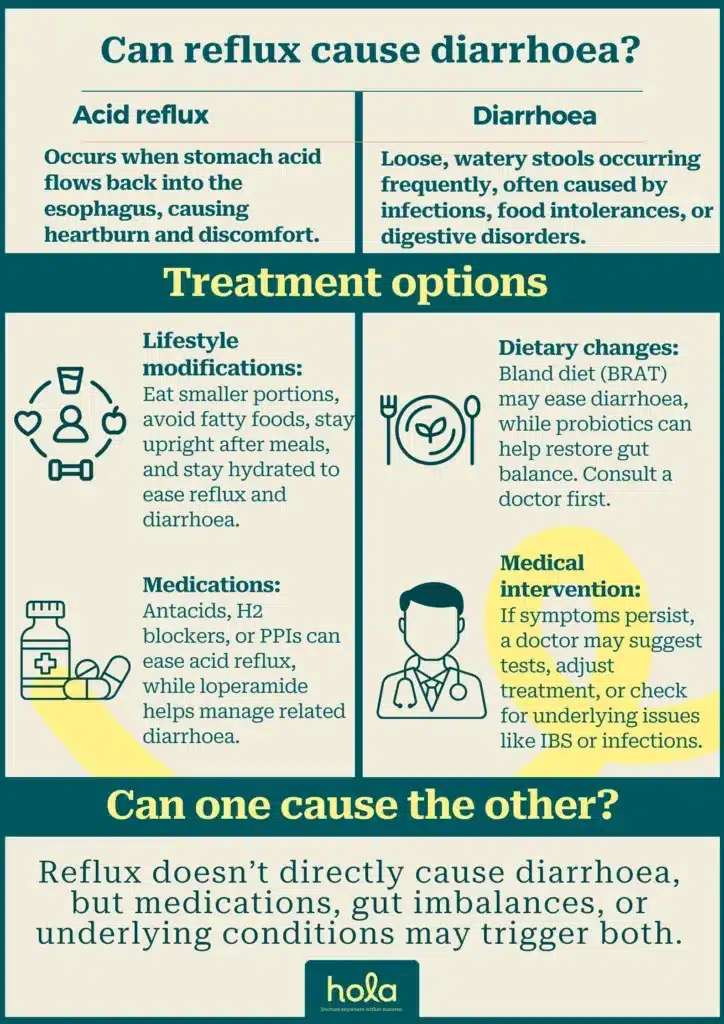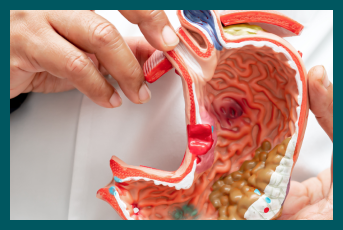Does reflux cause diarrhoea?
Written by the editorial staff writer at Hola. Medically Reviewed by Dr Nelson Lau, MBBS FRACGP, GP & Digital Health Specialist. Dr. Ammar AL-ANI, MBChB, CCBST, AMC. Blog updated on 03 November, 2025. Originally published on 27 March, 2025.

Contents

Overview
Ever had reflux and diarrhoea at the same time and wondered if they’re linked? You’re not alone. It’s more common than many realise. While one doesn’t directly cause the other, they often occur together due to shared factors like spicy foods, medications, or gut issues like Irritable Bowel Syndrome (IBS). Let’s explore the connection between reflux and diarrhoea, potential symptoms to watch out for, and when to seek medical advice.Are reflux and diarrhoea linked?
Reflux and diarrhoea don’t directly cause each other, but they often occur together because of common causes. Spicy or greasy meals, alcohol, and stress can irritate both the stomach and intestines. Some acid-blocking medicines, like PPIs, may induce diarrhoea as a side effect1. Gut issues like IBS, coeliac disease, or infections can lead to symptoms at both ends. So, while one does not directly cause the other, they’re often connected through shared underlying factors.Why do reflux and diarrhoea sometimes happen together?
Reflux and diarrhoea can feel like a double blow, but there’s usually an underlying cause. Here are some common culprits:- Food triggers: Fatty, spicy meals, caffeine, a greasy takeaway meal, or alcohol may irritate the gut and cause both reflux and loose stools.
- Irritable Bowel Syndrome (IBS): A common gut condition that often worsens with stress, changes in eating habits, or hormonal shifts. IBS can cause diarrhoea, abdominal bloating, and sometimes reflux-like symptoms.
- Infections: A stomach infection can lead to diarrhoea and nausea, sometimes worsening reflux. Urgent digestive symptoms caused by such infections frequently strike overnight, making an after-hours doctor the best resource for immediate medical guidance and support.
- Medications: Some reflux medications, especially proton pump inhibitors (PPIs), can cause diarrhoea as a side effect.
- Inflammation: Conditions such as gastritis or celiac disease can affect the entire digestive system, causing problems at both the upper and lower ends.

Symptoms
It makes it easier to understand which symptoms stem from reflux, and which are connected to common digestive issues:Reflux-related symptoms:
- Sour or bitter taste in the mouth
- Difficulty swallowing
- Pain or discomfort after eating
Digestive symptoms that can overlap:
- Diarrhoea
- Constipation
- Bloating or gas
- Stomach cramps
Treatment options
Addressing reflux and diarrhoea often means looking at the whole picture—your diet, lifestyle, and any medications.Lifestyle changes:
- Eat smaller meals more often
- Limit consumption of coffee, alcohol, and spicy meals
- Avoid lying down after eating
- Manage stress, as it has the potential to aggravate both reflux and IBS
Medications:
- Antacids (for quick relief)
- H2 blockers or PPIs (but PPIs may sometimes trigger diarrhoea, consult online GP if you notice this)
Diet tweaks:
- Follow a bland diet (such as BRAT: banana, rice, apple sauce, toast)
- Maintain a food journal to track triggers
- Trial probiotics (but check with your GP first)
Medical care:
- If symptoms persist, see your GP
- You may need a referral to a gastroenterologist or tests such as a stool sample or breath examination.
Feeling sick and unsure why? Speak with a GP online in 15 minutes.
When to contact a GP?
Understanding when to seek help can prevent anxiety and multiple trips to the chemist. See a GP if:- You have frequent heartburn
- Diarrhoea lasts more than a few days
- Reflux or diarrhoea happens regularly
- There is unintentional weight loss
- You notice blood in your stool or vomit
- Have acute chest pain or shortness of breath
- Have dehydration
How Hola Health helps
With telehealth, you don’t need to leave home to manage reflux or diarrhoea. Through Hola Health, you can:- Talk to a GP from home
- Get a prescriptions online sent directly to your local pharmacy
- Receive referrals to specialists if necessary
- Access same-day advice for persistent digestive issues
Conclusion
Reflux doesn’t directly cause diarrhoea, but the two often overlap due to shared triggers or treatments. If symptoms persist, talk to your GP. For convenient support, you can book a telehealth appointment with Hola Health and get treatment without leaving home.FAQ
Can acid reflux cause diarrhoea?
While acid reflux mainly affects the upper digestive tract, it can sometimes occur alongside diarrhoea due to shared triggers — such as certain foods, stress, or medication side effects. However, reflux doesn’t directly cause diarrhoea.Why do reflux and diarrhoea happen together?
These symptoms often share similar causes: eating spicy or fatty foods, consuming alcohol, taking antibiotics or acid-reducing medication, and having digestive conditions like irritable bowel syndrome (IBS) or gastroenteritis.Can stress trigger reflux and diarrhoea?
Yes. Stress affects gut motility and increases acid production, which may lead to both reflux and diarrhoea. Managing stress through relaxation, exercise, and healthy sleep can help reduce these episodes.Are reflux and diarrhoea signs of something serious?
Occasional episodes are common and usually mild. But if symptoms last longer than a few days, include vomiting, weight loss, black stools, or severe abdominal pain, you should seek medical attention.What foods can cause reflux and diarrhoea?
Trigger foods vary by person, but common culprits include:- Spicy or greasy foods
- Caffeine and alcohol
- Chocolate
- Citrus fruits and tomatoes
- Carbonated drinks
Can reflux medications cause diarrhoea?
Yes. Some acid-reducing medicines, especially proton pump inhibitors (PPIs), can alter gut bacteria and cause diarrhoea as a side effect. If this happens, consult your doctor before stopping or changing medication.How can I manage reflux and diarrhoea at home?
Try eating smaller meals, avoiding trigger foods, staying hydrated, and limiting caffeine and alcohol. Elevating your head while sleeping can also reduce reflux symptoms.Reference
Gastro-oesophageal reflux disease - reference linkWhat we treat
- Cough
- Nausea & vomiting
- Fever
- Hayfever
- Fatigue
- Sore throat
- Acne
- Hair loss
- Gout
- Eczema
- Rosacea
- Sunburn
- UTI
- Erectile dysfunction
- Contraception
- Morning sickness
- Morning after pill
- Prostate health
- Anxiety
- Depression
- Stress
- Grief & loss
- Antidepressants
- Premature ejaculation
- Asthma
- Blood pressure
- Blood thinners
- Diabetes
- Cholesterol
- Migraines & headaches
- Allergies
- Body ache
- Heartburn & reflux
- Sleep disorder
- Pain relief
- Gastro
Related Articles
Disclaimer
This blog is for general informational purposes only and does not indicate that Hola Health provides all treatments or preventive measures mentioned. It is not intended to be a substitute for professional medical advice. Always seek the guidance of your doctor or other qualified health professional with any questions you may have regarding your health or a medical condition. For emergencies please immediately contact 000. Any medical topics discussed are intended to educate, not to imply availability through Hola Health.
 Facebook
Facebook  X
X  Copy Link
Copy Link



